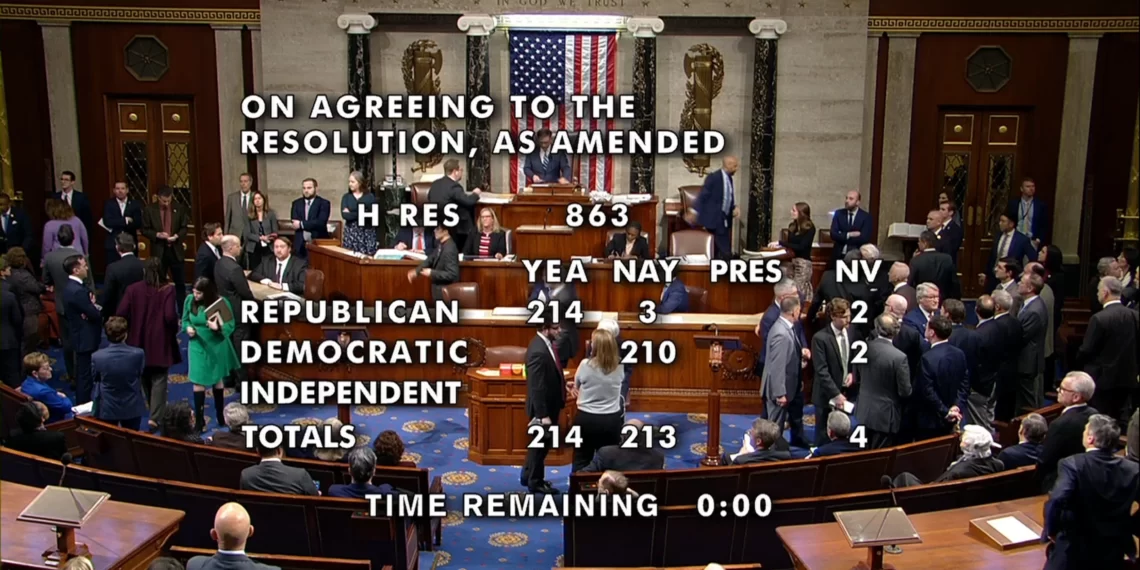The U.S House of Representatives has voted to impeach Alejandro Mayorkas, Joe Biden’s Secretary of Homeland Security, on what critics argue are explicitly political charges related to conditions at the southern border.
The Republican-led effort to capitalize on the immigration issue in this election year has set a concerning precedent and sparked debates over the boundaries of partisan politics.
Mayorkas faced two articles of impeachment, accusing him of “willfully and systematically” refusing to enforce existing immigration laws and breaching public trust by allegedly lying to Congress about the border’s security.
This marks the first time in history that a sitting Cabinet secretary has been impeached, emphasizing the highly contentious nature of this political maneuver.
It was nearly 150 years ago that the House voted to impeach President Ulysses S. Grant’s secretary of war, William Belknap, over a kickback scheme in government contracts. He resigned before the vote.
While Republicans assert their stance, Democrats, including President Biden, denounce the impeachment as an act of “unconstitutional partisanship.”
Biden, in a statement released after the vote, criticized House Republicans for targeting an “honorable public servant” and accused them of playing “petty political games.”
He said, “History will not look kindly on House Republicans for their blatant act of unconstitutional partisanship.”
The administration views this move as a diversion from the critical work the Department of Homeland Security is engaged in daily.
Mayorkas, addressing the allegations, dismissed them as “baseless” and emphasized his focus on the department’s responsibilities. He highlighted the dedication of the department’s workforce and expressed determination to uphold their commitment to the American public.
The broader context of this impeachment effort reveals a larger Republican strategy to target several Biden administration officials for potential impeachment, including Vice President Kamala Harris, Attorney General Merrick Garland, FBI Director Christopher Wray, and Defense Secretary Lloyd Austin. However, these attempts are in earlier stages and face more significant obstacles compared to Mayorkas’ situation.
The Democrats argue that House Republicans are undermining the constitutional impeachment process for political gains, emphasizing that Mayorkas was actively working on bipartisan solutions to address border security challenges.
Homeland security Spokesperson, Mia Ehrenberg condemned the impeachment as “baseless” and “unconstitutional,” accusing Republicans of wasting valuable time on a groundless endeavor.
Yet, the impeachment raises questions about the erosion of the constitutional meaning of impeachment.
Democratic Representative Jamie Raskin voiced concerns that Republicans have succeeded in “degrading and tarnishing” the impeachment process, turning it into a tool for partisan maneuvers rather than a mechanism to address genuine wrongdoing.
Republican House Minority Whip, Steve Scalise countered these arguments, stating that the impeachment sends a message that they won’t tolerate a failure to secure the homeland.
The perceived failure on border security has become a rallying point for Republicans, and they argue that this impeachment is a necessary step to hold officials accountable.
As the charges against Mayorkas move to the Senate for a trial, the partisan divide deepens. Senate Majority Leader Chuck Schumer has labeled the case a “sham impeachment” and a “new low for House Republicans.”
The Senate’s response will be crucial in determining the long-term consequences of this political spectacle.
In an era where the American public demands effective governance and solutions to pressing issues, the partisan use of impeachment for political gain only further erodes public trust in the democratic process.
The focus should be on constructive debates, bipartisan solutions, and addressing the substantive challenges faced by the nation rather than engaging in a dangerous game of political brinkmanship.
In the end, history will judge not only the actions of individual politicians but also the collective integrity of democratic institutions.
It is pertinent for lawmakers to set aside partisan differences and work together to address the urgent issues confronting the country, including border security, immigration reform, and national unity.
READ ALSO: U.S Senate Passes $95bn Foreign Aid Bill























